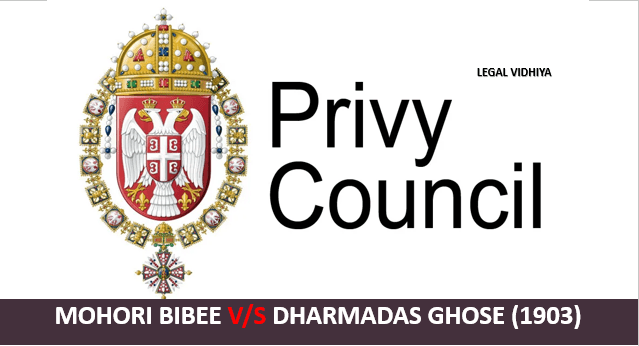
| Citation | (1903) ILR 30 Cal 539 (PC) |
| Date of Judgement | 04 March 1903 |
| Court | Privy Council |
| Appellant | Mohori Bibi |
| Respondent | Dharmodas Ghose |
| Judge(s) Sitting | Lord Davey, Lord McNaughton, Lord Lindley, Sir Andrew Scoble, Sir Ford North,Sir Andrew Wilson. |
FACTS
The respondent was Dharmodas Ghose in this case. He was a minor (under the age of 18) and the sole owner of his real estate. Dharmodas Ghose’s mother was assigned as his legal guardian by the Calcutta High Court. He was a minor when he acquired a mortgage on his own immovable property in favor of appellant Brahmo Dutta for Rs. 20,000 at 12% interest per year. Brahmo Dutta, a money lender at the time, secured a Rs. 20,000 loan, and the management of his firm was in the hands of Kedar Nath, Brahmo Dutta’s attorney. Dharmodas Ghose’s mother notified Brahmo Dutta about Dharmodas Ghose’s minority on the date such mortgage deed was started, but the proportion or sum of the loan that was actually supplied was less than Rs. 20,000. The defendant’s representative, who genuinely acted on behalf of the money creditor, gave money to the plaintiff, a minor, and he was fully aware of the plaintiff’s inability to carry out or enter into a contract, as well as that he was ineligible to mortgage his own property. On September 10, 1895, Dharmodas Ghose and his mother filed a legal action against Brahmo Dutta, claiming that the mortgage Dharmodas executed was commenced while he was a minor or infant, and thus such mortgage was void, disproportionate, or improper, and thus such contract should be revoked. Brahmo Dutta died while this petition or claim was being processed, and his executors then litigated the appeal or petition. The plaintiff contended or confronted that in such a circumstance, no relief or assistance should be offered to them since, according to him, the defendant had dishonestly misrepresented the fact about his age and because if the mortgage is terminated at the request of the defendant, Dharmodas Ghose.
ISSUE
- Was the contract void under sections 2, 10, and 11 in the Indian Contract Act, 1872 ?
- Is the contract with a minor void or voidable?
- Was Dharmodas Ghose liable for returning the money from the loan he received?
ARGUMENTS
Plaintiff
- The respondent was a major at the time he executed the mortgage.
- The appellant and his representative had no idea the respondent was a youngster.
- The respondent misrepresented his age and thus is prevented from seeking redress.
- The respondent cannot argue that he was a minor at the time the mortgage was executed under Section 115 of the Indian Evidence Act of 1872.
- Sections 64 and 38 of the Indian Contract Act of 1872 with Section 41 of the Specific Relief Act of 1877, oblige the respondent to repay the amount advanced.
Defendant
- The respondent’s genuine age was known to Brahmo Dutta and his agents Kedar Nath.
- Because the respondent was a minor at the time the mortgage was executed, the contract is null and void.
JUDGEMENT
After reviewing several relevant legal rules, the court concluded that minors are unfit to contract as per Section 11 in the Indian Contract Act of 1872, and any minor’s agreement is null and void. As a result, relief cannot be granted under Section 64 or even Section 65 of The Indian Contract Act, 1872, because both provisions require the existence of an agreement or contract between competent parties, which is not present in this case. Concerning the discretion provided under section 41 (section 33 of the 1963 act) of the Specific Relief Act, 1963, the court of first instance and appellate court have already concluded that based on the events of the case where there was full knowledge of the infancy, the court did not see any reason to compel the repayment and interfere with the desecration which had already been exercised.
REFERENCES
https://lawplanet.in/mohori-bibi-vs-dharmodas-ghose-case-summary-1903-pc/
https://lawlex.org/lex-bulletin/case-summary-mohori-bibee-vs-dharmodas-ghose/23391
Written by Monal an intern under legal vidhiya.




0 Comments